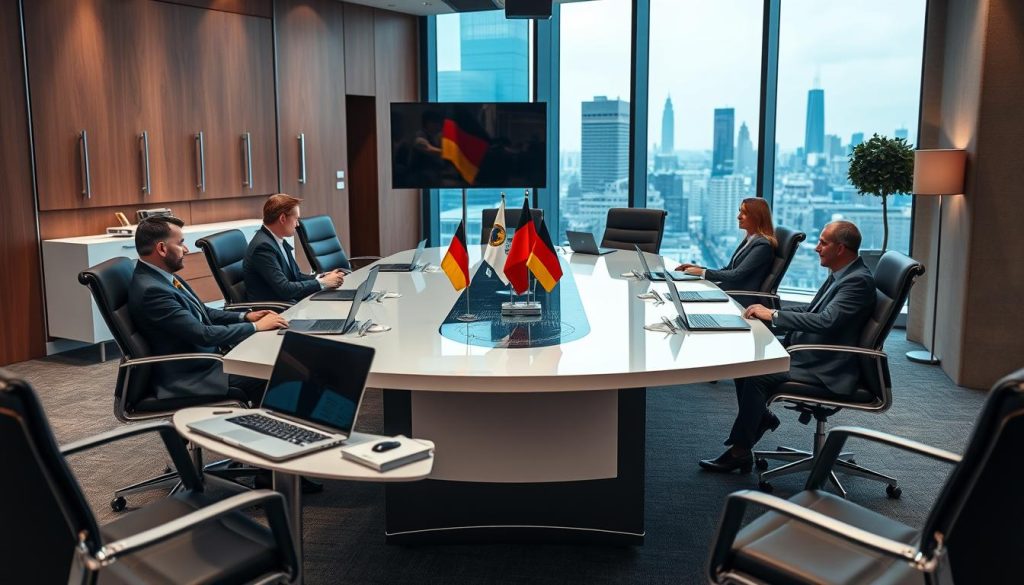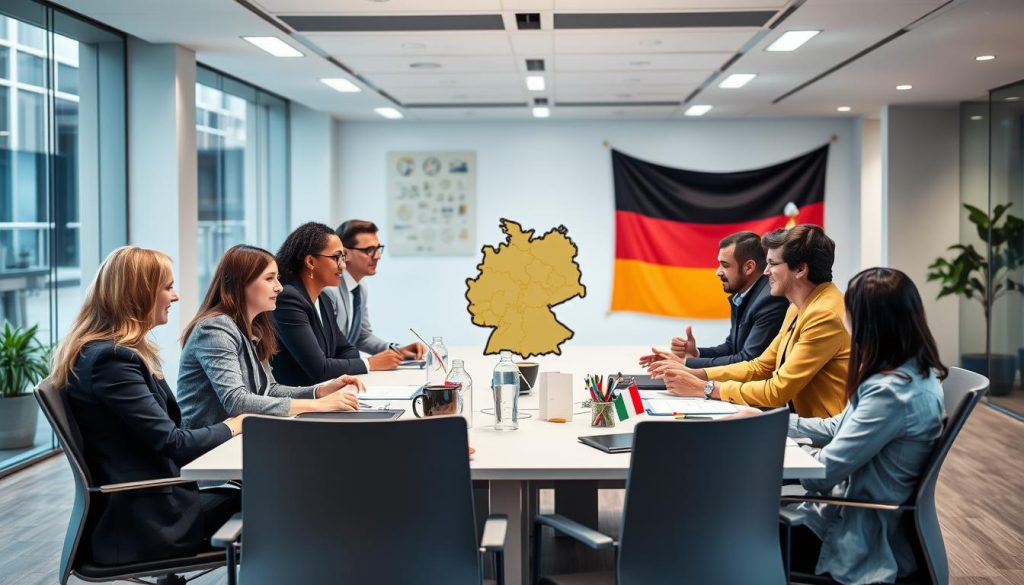In today’s world, knowing about business culture is key, especially in strong economies like Germany’s. The culture in Germany is influenced by history and social norms. It shows a unique corporate culture that values precision, reliability, and professionalism.
- The Importance of Business Culture in Germany
- Key Characteristics of German Business Culture
- Communication Styles in German Business
- Decision-Making Processes in German Companies
- Work Ethics and Professionalism in Germany
- The Role of Hierarchies in German Organisations
- Dress Code and Professional Attire in Germany
- Networking Etiquette in German Business
- Business Meetings: Structure and Etiquette
- Understanding Business Formalities in Germany
- Negotiation Styles: What to Expect
- Cross-Cultural Considerations in German Business
- Conclusion of Business Transactions in Germany
- Future Trends in German Business Culture
Getting to know these aspects can really boost productivity and improve work relationships. As global business grows, it’s more crucial to understand the finer points of working in Germany. This knowledge is vital for international relations and negotiations.
The Importance of Business Culture in Germany

Business culture in Germany is very important. It helps teams work well together and builds strong relationships with partners. It sets the rules for how people interact at work.
For international companies, knowing about German business culture is key. It helps create trust. Without it, misunderstandings can ruin deals and harm partnerships. This can really hurt a company’s success.
Look at big German companies like Siemens and BMW. Their success comes from a strong culture that values precision and clear communication. This shows how important it is to understand and embrace the local culture for success in Germany.
Key Characteristics of German Business Culture

The business culture in Germany is known for several key traits. Precision and reliability are at the heart of it. These qualities shape the work environment and ensure projects are done well.
Quality is a big deal in German businesses. They focus on doing things right, showing responsibility and diligence. This means they aim for high standards in everything they do.
Working in Germany means understanding its culture. For example, being on time shows respect for others’ time. This focus on excellence helps German companies lead globally.
Communication Styles in German Business

Knowing how Germans communicate is key to doing well in business there. They value direct talk, which shows they like things clear and quick. This is different from other cultures, where communication can be more subtle.
Learning about direct talk and body language helps us see the German work world better.
Directness vs. Indirectness
In Germany, talking straight is important. People like it when things are said clearly, making sure everyone knows what’s going on. This makes solving problems and making decisions easier.
On the other hand, indirect talk can lead to confusion. It can slow things down and cause misunderstandings.
Non-verbal Communication in Germany
Body language and facial expressions are big in German business. They show feelings and what someone means. For example, looking someone in the eye shows you trust them.
Knowing these signs helps improve how we work together and builds stronger relationships.
Decision-Making Processes in German Companies

In German firms, decision-making is complex. It shows a deep understanding of teamwork and authority. There are two main ways: consensus and a top-down approach. Each has its own impact on how companies work and face problems.
Consensus vs. Hierarchical Approach
Many German companies prefer consensus decisions. This means everyone gets a say before a choice is made. It makes employees feel more involved and happy.
On the other hand, some sectors still use a top-down method. Here, leaders make big decisions based on their knowledge. Both methods have their strengths, fitting different company cultures.
The Role of Data and Analysis
Data analysis is key in German firms’ decision-making. Companies rely on facts, not just opinions. This makes sure decisions are solid and fair.
Using strong data analysis with teamwork makes decisions better. This is true for both consensus and top-down methods.
Work Ethics and Professionalism in Germany

In Germany, work ethics are key to the professional scene. A big part of this is being punctual and managing time well. These traits show reliability and high standards. They also help keep employees happy and productive.
Punctuality and Time Management
In Germany, being on time is very important. It shows respect and professionalism. Businesses have strict time rules to boost productivity and get things done fast.
This focus on time helps with work and relationships. Clients and partners expect things to be done on time. Here are some points about punctuality:
- Being late can mess up schedules and team work.
- Using tools and strategies to manage time well is important.
- Being punctual keeps a professional image and reputation.
Work-Life Balance in German Businesses
Germany is now focusing more on work-life balance. This means looking after employee wellbeing as much as business success. Happy employees do better at work. Here are some key points:
- Flexible hours for personal things.
- Supporting mental health at work.
- Encouraging breaks and holidays to avoid burnout.
The Role of Hierarchies in German Organisations

Understanding the organisational hierarchy in German companies is key for teamwork and integration. The German workplace has a clear structure with defined levels of authority and duties. This makes roles clear, boosting the efficiency of operations.
In German firms, hierarchies lead to a formal leadership approach. Top managers have a lot of power to make decisions, showing trust in their skills. This means lower staff usually wait for orders from their bosses. This setup promotes respect for authority and clear communication at every level.
Organisational hierarchies greatly affect corporate culture in many ways:
- Decision-making processes, where higher-level managers shape strategic directions
- Communication channels, which tend to follow vertical lines to maintain order
- Employee initiatives, often requiring approval from upper management before implementation
Knowing these hierarchical systems well is crucial for those working with German businesses. It leads to better teamwork and project success.
Dress Code and Professional Attire in Germany

Knowing what to wear in Germany is key for good business meetings. Wearing the right clothes shows respect and professionalism. These values are very important in German work places. The choice between formal and casual depends on the job and the meeting.
In fields like finance and law, it’s all about being formal. Men wear suits, ties, and polished shoes. Women choose smart dresses or suits that look professional. But, in creative fields, things are more relaxed. Here, people can show their style through their clothes.
Looking good is always important. Paying attention to grooming and fit is crucial. It helps make a good first impression. People should think about the setting and dress accordingly to meet expectations.
Networking Etiquette in German Business

Networking in Germany is all about building trust and strong business ties. It takes time, as Germans value trust a lot. To succeed, you need to build connections that last.
Building Trust and Relationships
Trust is key in German business. It grows through regular talks and follow-ups. Here’s how to build trust:
- Keep in touch with people to show you care.
- Share information openly and honestly.
- Always keep your promises to show you’re reliable.
These steps help create lasting professional bonds. They can lead to great partnerships.
The Importance of Formal Introductions
First meetings are very important in Germany. They set the stage for future interactions. Here’s how to make a good impression:
- Start with a firm handshake and eye contact.
- Use titles and surnames until you’re told otherwise.
- Thank the person who introduced you to start building a connection.
Getting these right can really boost your networking. It helps build strong business relationships in Germany.
Business Meetings: Structure and Etiquette

Knowing how to behave in German business meetings is key. Good meetings need proper planning and following rules. This part looks at how to set up and run meetings in Germany.
Preparation for Meetings
Good German meeting prep includes a few important steps. Before a meeting, make sure to:
- Send out a clear agenda with what will be discussed.
- Make sure everyone has what they need to join in.
- Check who’s coming and stress the need to be on time.
This helps keep things professional and clear. It meets what your colleagues expect.
Phrasing and Conduct During Meetings
Good meeting conduct means being clear and respectful. You should:
- Share your ideas clearly, without being vague.
- Listen well and let others speak before you.
- Keep a formal tone, showing the seriousness of the topics.
By doing these things, you help everyone have a good meeting. Knowing how to act in meetings is very important in Germany.
Understanding Business Formalities in Germany

In the world of business, knowing the key formalities is crucial. In Germany, these formalities are key to building strong professional relationships. It’s important to understand the protocols to ensure good communication and respect among colleagues and clients.
In Germany, both written and spoken communication is strict. Using the right titles and greetings is essential. People are expected to use formal titles and academic ones when needed. This shows respect for hierarchy and culture.
Formal communication is not just about language. It also includes how you act in meetings and when introducing yourself. Following the German business protocols shows you are credible and professional. Important things to remember include:
- Preparing documents with precise language
- Replying to emails and messages on time
- Talking clearly and briefly in discussions
Knowing how to communicate formally can really help you succeed in Germany’s business world.
Negotiation Styles: What to Expect

Effective negotiation in Germany relies on knowing the common negotiation styles. German negotiators focus a lot on preparation. This can make or break the outcome of talks.
It’s important to understand what the other side wants and expects. This helps set the stage for successful talks.
Preparing for Negotiations
Getting ready for negotiations is key in Germany. Here are some things to keep in mind:
- Learn about the people involved to know their goals
- Have clear goals and limits for the talks
- Think about possible objections or challenges
Being thorough in your preparation can lead to smoother talks. It helps create a good atmosphere for reaching agreements.
Understanding Concessions and Compromises
Concessions in German business are handled with care. They show a balance between being firm and working together. Here are some important points:
- Concessions are made thoughtfully and strategically
- German negotiators look for fairness and mutual gains
- Being open to compromise can help build lasting relationships
Grasping the details of concessions can greatly affect the outcome of negotiations. It can lead to agreements that last longer.
Cross-Cultural Considerations in German Business

Doing business across cultures means understanding local customs and their subtleties. In Germany, adapting to the culture helps create smooth interactions and strong partnerships. It’s crucial to be aware of cultural differences in business to succeed.
Adapting to Local Customs
To do well in Germany, you need to get local customs. Knowing the rituals and what’s expected can build respect and strong relationships. Here are some important points:
- Punctuality is key. Being on time shows you’re reliable and committed.
- Knowing how to greet and introduce yourself formally shows you’re professional.
- Understanding direct communication styles can make talks clearer.
Recognising Cultural Differences
Knowing about cultural differences is vital in cross-cultural business. Missing these nuances can lead to misunderstandings. Here are some differences to keep in mind:
- Views on hierarchy can differ, affecting how decisions are made.
- Views on time and deadlines can vary, so be flexible with plans.
- How to solve conflicts can depend on culture, so patience is key.
Conclusion of Business Transactions in Germany

Finalising agreements in Germany needs a careful plan. It’s important to cover all parts of closing deals. Knowing what these parts are is key to success.
Documents are very important in German business deals. It’s wise to make all contracts carefully. They should clearly show what each side must do. This avoids confusion and makes working together better.
- Have deep talks to make sure everyone understands the deal.
- Use formal language in talks to show professionalism.
- Think about getting legal help to follow local rules.
After agreeing, the next step is to document everything. This includes signed contracts that guide future work. Make sure to write down all important dates and conditions clearly.
Deals in Germany are more than just papers. Trust and respect are crucial for lasting relationships. Keeping in touch after the deal helps keep these relationships strong. This makes future dealings easier.
Future Trends in German Business Culture
The future of German business is changing fast. Companies are moving towards a more digital way of working. This means better connections and teamwork across the board.
Remote work and new digital tools are changing old ways of working. They’re making workplaces more lively and open.
Germany is also focusing more on being green. Businesses are taking steps to protect the environment and help society. This makes them look good in the eyes of people who care about the planet.
There’s a big push for work-life balance too. Companies are looking into new ways to keep employees happy and engaged. This includes flexible work hours and a better balance between work and personal life.
These changes show that Germany is embracing different work styles and being more open. It’s creating a space for new ideas and innovation in the business world.

